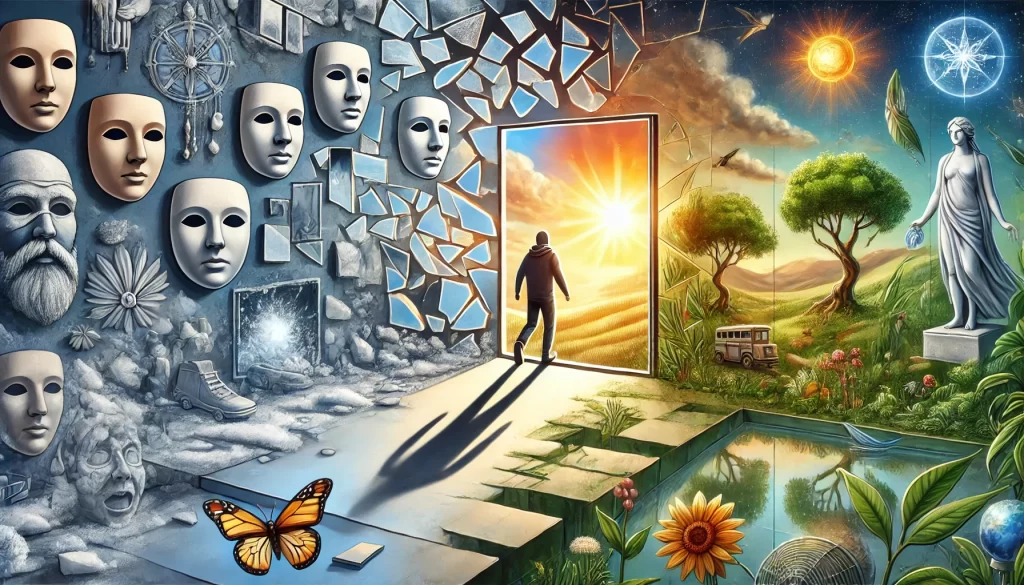
We spend a good part of our lives trying to avoid fear.
We plan, we prepare, we hustle, we build, we chase. We try to stay ahead of it. Outsmart it. Outrun it. But fear isn’t something outside of us – it’s something we’ve built inside. Brick by brick. And most of those bricks are stories we’ve told ourselves about ownership, control, and permanence.
Hindu philosophy offers a powerful provocation: you do not own, and you do not owe. You are not in control of what you think you are. And the belief that you are – that you can manage outcomes, dictate consequences, predict what life should give you – is not wisdom. It’s ignorance.
It’s a confronting thought, especially in a world that teaches us the opposite. In business, in leadership, in life, we’re told to strive, accumulate, maximize. The illusion isn’t just cultural – it’s institutional. You’re praised for “taking control of your destiny,” for “owning the outcome.” But under that rhetoric lies a trap: the more you believe you can control, the more fearful you become of losing it. The tighter your grip, the more brittle your peace.
The ancients had no time for this performance. They observed, quietly and astutely, that nothing in this world is truly yours. Not your relationships, not your wealth, not your career, not even your sense of self. Everything you touch is borrowed. Everything you build will fade. You came with nothing, and you will leave with nothing. And every illusion of ownership in between is a kind of theater – sometimes noble, sometimes necessary, but always temporary.
If you can sit with that – not as a defeat, but as liberation – you begin to loosen your hold. You begin to see fear for what it really is: an emotional tax we pay for illusions we refuse to release.
It doesn’t mean you stop caring. It doesn’t mean you detach in some cold, performative way. It means you engage fully, but lightly. You act with purpose, but not possession. You love without clinging. You build without begging the world to let it last forever.
There’s a subtle, but critical shift here – from fear to freedom. Because fear is fed by the belief that what you have can be taken from you. But freedom arises when you realize: nothing was ever really yours.
This insight isn’t just spiritual – it’s strategic. Some of the most resilient leaders, thinkers, and artists I’ve known operate from this place of quiet detachment. Not apathy, not indifference. Just a deeper sense of perspective. They know the game. They know they’re players, not owners. And that’s what gives them courage. They can take risks others can’t. They can speak truths others won’t. Because they’ve already made peace with impermanence.
The Bhagavad Gita speaks directly to this. Arjuna, the great warrior, is paralyzed by fear on the battlefield – not of death, but of consequence. Krishna doesn’t tell him to escape or retreat. He tells him to act, but without attachment to the result. Do your duty, but let go of the outcome. That is the way through fear.
Modern frameworks echo this ancient wisdom. In psychology, for example, it’s called radical acceptance. In leadership, it shows up as equanimity. In creativity, it’s the willingness to fail without being defined by the failure. Even Stoicism mirrors this posture: you control your choices, not the consequences.
So what does it mean, practically, to break free of fear?
It means questioning the stories you’ve told yourself – about what you must protect, achieve, prove, or preserve. It means recognizing that identity, status, reputation, legacy – these are all shapes you’ve sculpted from sand. They may look solid, but they can be washed away at any moment.
It means finding peace in participation, not possession. You show up. You give fully. You love deeply. And you let go, because you were never meant to hold on.
There’s something disarmingly beautiful about this. To live with that kind of honesty is not to live passively – it’s to live vividly, but humbly. You stop pretending that you are the author of the world, and you start writing your chapter with whatever ink is given to you.
That’s not weakness. That’s clarity. And clarity is what kills fear.
When you understand that the world does not revolve around you, but that you still have a role to play in it – that’s when the fear quiets down. That’s when you stop flinching at loss. That’s when you stop being afraid of the end, because you realize there was no “mine” to lose.
There is no perfect armor for the uncertainty of life. No amount of planning, positioning, or preparation will protect you from the truth: you are walking toward your death. Slowly, surely. Just like everyone else.
But that is not a tragedy – it is the setting for a powerful, liberating truth.
Because once you realize you have nothing to lose, you finally remember how to live.